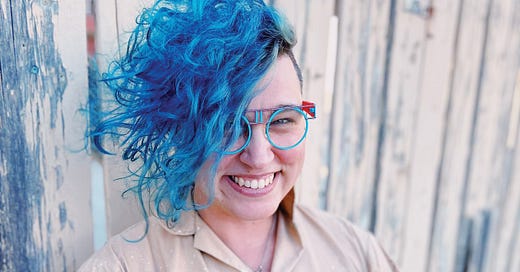BONUS CONTENT: A.E. Osworth Doesn't Want You to Worry About Voice
On the fallacy of a writer's "voice," why head-hopping is okay, and their recommendations of things to read, watch, listen to, and do.
Last week’s interview was my second with A.E. Osworth. I first spoke to them four years ago when we chatted about their debut novel, We Are Watching Eliza Bright, for Shondaland. (Fun fact: A good chunk of that book is narrated by incel Redditors, and immediately after our interview was published, it appeared on a thread created by…angry Redditors. It was very meta.)
This time around, Austen and I discussed their wild sophomore novel Awakened, which includes trans witches, magic, seances, drag shows, hot sex, video games, and an AI antagonist. It’s unlike anything I’ve ever read and I was thrilled to get lessons from Austen—who is also a writing professor—about character development, head-hopping, and developing a writing “voice.”
You can find outtakes from our interview below, along with their recommendations of things to watch, read, listen to, and visit.
This content contains affiliate links. I am an affiliate of Bookshop.org and I will earn a commission if you click through and make a purchase.
Interview Extras
Something that came to mind when I was reading your book was voice. I think it's hard for a lot of writers to find their voice and to figure out how they want to present their work. I don't know if this is going to be taken as a compliment, but I kept thinking of Tom Robbins when I was reading Awakened. Because whether you like his work or not, there was nothing else out there like it. It’s similar to Awakened. I have never read a book like this.
I take that very much as a compliment.
Good! Was it difficult for you to find your voice as a writer?
So the thing about voice—and I also mean this as a compliment and not as what it's going to come out as—I take my grad students to task all of the time for using the word “voice.” What does it mean exactly? What is it built out of, exactly? What we're talking about when we talk about voice is just an add-up of a lot of other different craft concepts. As soon as you abandon the idea that voice is its own craft concept, it gets way easier to do. You [can] just throw it out and say, “Okay, what we're talking about here is a distinct point of view where we have a closeness or a farness to interiority.” In this case, we have an extreme closeness to characters' interiority. We have an extreme omniscience, where our narrator can sometimes, for part of the book, see into the future. That's a narrative superpower that we have. This narrator—and this is a spoiler—is pretty ageless and has seen a lot of language and so is going to use old fashioned language and new language together in the same sentence. Okay, now we're getting a list of ingredients where it gets way, way, way, way easier to replicate than just, "It's a voicey book."
Keep reading with a 7-day free trial
Subscribe to Creative Reverberations to keep reading this post and get 7 days of free access to the full post archives.





